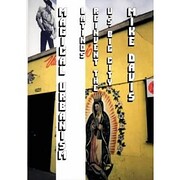

Klik op een omslag om naar Google Boeken te gaan.
|
Bezig met laden... Magical Urbanism: Latinos Reinvent the U.S. City (2000)door Mike Davis

Geen Bezig met laden...
Meld je aan bij LibraryThing om erachter te komen of je dit boek goed zult vinden. Op dit moment geen Discussie gesprekken over dit boek. geen besprekingen | voeg een bespreking toe
Onderdeel van de reeks(en)Haymarket Series (2000) Prijzen
Winner of the 2001 Carey McWilliams Award Is the capital of Latin America a small island at the mouth of the Hudson River? Will California soon hold the balance of power in Mexican national politics? Will Latinos reinvigorate the US labor movement? These are some of the provocative questions that Mike Davis explores in this fascinating account of the Latinization of the US urban landscape. As he forefully shows, this is a demographic and cultural revolution with extraordinary implications. With Spanish surnames increasing five times faster than the general population, salsa is becoming the predominant ethnic rhythm (and flavor) of contemporary city life. In Los Angeles, Houston, San Antonio, and (shortly) Dallas, Latinos outnumber non-Hispanic whites; in New York, San Diego and Phoenix they outnumber Blacks. According to the Bureau of the Census, Latinos will supply fully two-thirds of the nation's population growth between now and the middle of the 21st century when nearly 100 millions Americans will boast Latin American ancestry. Davis focuses on the great drama of how Latinos are attempting to translate their urban demographic ascendancy into effective social power. Pundits are now unanimous that Spanish-surname voters are the sleeping giant of US politics. Yet electoral mobilization alone is unlikely to redress the increasing income and opportunity gaps between urban Latinos and suburban non-Hispanic whites. Thus in Los Angeles and elsewhere, the militant struggles of Latino workers and students are reinventing the American left. Fully updated throughout, and with new chapters on the urban Southwest and the explodiing counter-migration of Anglos to Mexico, Magical Urbanism is essential reading for anyone who wants to grasp the future of urban America This paperback edition of Mike Davis's investigation into the Latinization of America incorporates the extraordinary findings of the 2000 Census as well as new chapters on the militarization of the border and violence against immigrants. Geen bibliotheekbeschrijvingen gevonden. |
Actuele discussiesGeenPopulaire omslagen
 Google Books — Bezig met laden... Google Books — Bezig met laden...GenresDewey Decimale Classificatie (DDC)305.868Social sciences Social Sciences; Sociology and anthropology Groups of people Ethnic and national groups ; racism, multiculturalism Latino/asLC-classificatieWaarderingGemiddelde: (3.44) (3.44)
Ben jij dit?Word een LibraryThing Auteur. |
||||||||||||||||||||||||||||||||||||||||||||||||||||||||||||||||||||||||||||||||||||||||||||||||||||||||||||||||||||||||
Davis puts his considerable talent to good use in the 175 pages of this book on all the versions of Latinos who will constitute the global culture of the future: A Pan-American 21st century.
HIs use of statistics falls into leftist ideology of victimization and blames the “white culture” for past oppression of other minorities. Davis’ use of statistical data always supports these principles of analysis. He is therefore trapped into only seeing any reality of the world in one way and the conclusion is foregone. This book is therefore obsolete although Davis is admirable in that he tries to immerse himself in the local communities to give as honest as possible evaluation of people’s lives while in flux.
The best part of the book (originally published in 2000) is not that he has been an accurate prophet, (he’s not) but that he uses literary and periodical material in his footnotes which would otherwise be lost to other researchers or academics. He also revives some past events which were not as momentous as I remember and locates them in a larger historical context.
The title comes from Davis’ contention that life on the US border towns is a new existence of the interpenetration of cultures. Like magical realism (a Hispanic literary genre), magical urbanism is a new way of impoverished living. He calls it First World meets Third World. Davis says this is the template for the future of America as legal and illegal immigration flows into America from the south. Davis concludes that US labor unions will preserve this magical realism into the future as Latinos migrate further into the interior of the continental US. Strangely, Davis says that unions will not force Latinos to assimilate into American culture (a good thing for Davis’ claim to defend identity of migrants’ culture) while also providing for a standard of living far above what would be possible in their home countries.
This is an important book for the students of the History of Los Angeles, Urban Studies, Sociology,and Latino Culture.